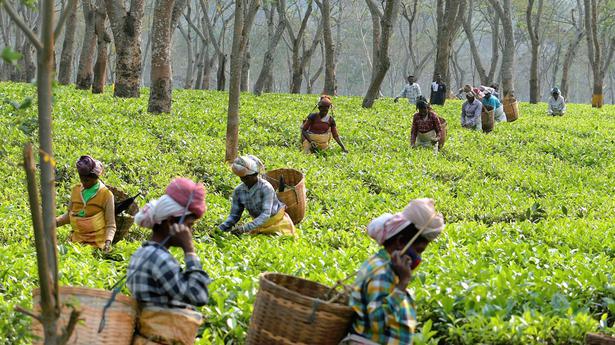
Assam hikes daily wages of tea garden workers by ₹27
The Hindu
The decision to revise the wages was taken in a meeting among Assam Chief Minister Himanta Biswa Sarma, representatives of tea associations and workers’ unions.
The daily wages of tea garden workers in Assam were hiked by ₹27, the second increase in such payments since the Himanta Biswa Sarma-led government came to power in the State in May last year, an official said on August 9. The upward revision of wages will be effective from August 1, he said.
The decision to revise the wages was taken in a meeting among Mr. Sarma, representatives of tea associations and workers’ unions.
"Happy to share that in a meeting with tea associations, it was decided to hike the workers' wage by ₹27, thus raising their daily wage to ₹232 and ₹210 in Brahmaputra Valley & Barak Valley respectively," the Chief Minister wrote on Twitter. Mr. Sarma said welfare of tea garden workers has always been his government's top priority. He said the cash hike in daily wages of tea garden workers is "over and above the ration and other benefits".
"All garden workers will get ration cards & we urged the gardens to take Fair Price Shop licenses. Representatives of Indian Tea Association, NE Tea Association,Tea Association of India, Bharatiya Chah Parishad, Assam Tea Planters' Association & Assam Chah Mazdoor Sangha were present," he said on the microblogging site.
Traditionally, tea workers' wages are largely paid in two components — cash and other benefits such as ration, health services and education. The previous wage revision was done in May last year soon after Mr. Sarma became the Chief Minister and it was made effective from February 22, 2021.
During Wednesday's meeting, Mr. Sarma also assured the planters of raising the government subsidy for orthodox tea from ₹7 to ₹10 per kg. State Industry and Commerce Minister Bimal Borah had on Tuesday held a meeting with small tea growers and workers for the fixation of wages. "…representatives from the various tea workers' unions have been requesting that the worker's wages be fixed.

“Writing, in general, is a very solitary process,” says Yauvanika Chopra, Associate Director at The New India Foundation (NIF), which, earlier this year, announced the 12th edition of its NIF Book Fellowships for research and scholarship about Indian history after Independence. While authors, in general, are built for it, it can still get very lonely, says Chopra, pointing out that the fellowship’s community support is as valuable as the monetary benefits it offers. “There is a solid community of NIF fellows, trustees, language experts, jury members, all of whom are incredibly competent,” she says. “They really help make authors feel supported from manuscript to publication, so you never feel like you’re struggling through isolation.”










